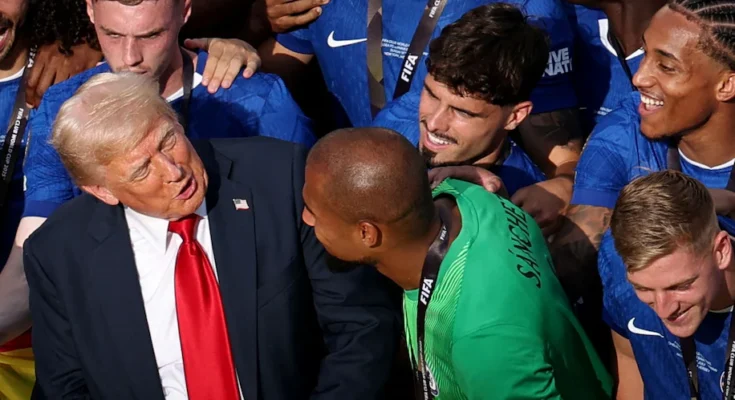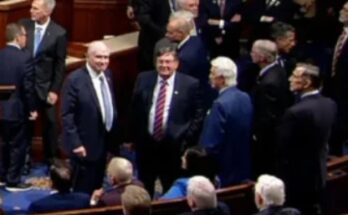You wouldn’t know it from what FIFA, soccer’s international governing body, is about to do, but it has a human rights policy.
“Guided by its human rights approach, FIFA embeds its commitment throughout the organisation and engages in an ongoing due diligence process to identify, address, evaluate and communicate the risks of involvement with adverse human rights impacts. … FIFA will constructively engage with relevant authorities and other stakeholders and make every effort to uphold its international human rights responsibilities.”
But here was Sunday’s final of the Club World Cup — a sort-of dry run over the past four weeks for its 2026 World Cup in North America scheduled to be anchored in the United States — with FIFA boss Gianni Infantino and champion Chelsea in celebratory embrace with President Donald Trump, who is defining his second term in the White House not by protecting human rights but by trampling them.
Indeed, a day before the final at MetLife Stadium in New Jersey, several lawmakers toured a hastily built detention center in the Florida Everglades for undocumented migrants and described it in inhumane terms. Trump officials and supporters jovially named the encampment “Alligator Alcatraz” after the vicious reptiles that live in the surrounding swamp and the notorious prison of last resort in the San Francisco Bay that was shuttered because the government deemed it too expensive to keep humane.
On Friday, a federal judge in California ordered a stop to Trump administration raids of everything from farms to public parks to car washes looking for undocumented laborers. The actions erupted into violent confrontations between National Guard troops in riot armor and protesters trying to protect the immigrants being hunted.
Anecdotal narratives illustrate the enforcement of Trump’s immigration policies as xenophobic at best. People such as Kilmar Abrego García, the Salvadoran man living in Maryland on protected status whom the Trump administration admitted it mistakenly deported in a raft of detainees to a dissolute El Salvador prison. He’s still in custody. People such as University of Florida student Felipe Zapata Velásquez, a Colombian whom Gainesville police arrested on traffic offenses and then turned over to Trump immigration officers. He agreed to be deported rather than face detention.
Then there are those such as Rümeysa Öztürk, a Tufts University PhD student on a student visa from Turkey, and Badar Khan Suri, a Georgetown academic, whom Trump’s masked squads snatched off streets into unmarked vehicles and whisked away to who-knew-where because they were said to have voiced opposition to Israel’s war in Gaza. Both eventually were released but not necessarily freed.
And there is an expanding list of countries from which Trump would like to ban citizens’ entry to the United States. They include mostly sub-Saharan African nations to go along with countries in Latin America, Central Asia and the Middle East. They include countries that certainly will qualify for the World Cup. Iran already has.
All of this is an affront to what FIFA claims it stands for. Human Rights Watch reminded FIFA of as much last month.
“FIFA should publicly acknowledge the threat U.S. immigration and other anti-human rights policies pose to the tournament’s integrity and use its leverage with the U.S. government to ensure that the rights of all qualified teams, support staff, media, and fans are respected as they seek to enter the United States regardless of nationality, gender identity, religion, or opinion,” said Minky Worden, director of global initiatives at Human Rights Watch. “FIFA should establish clear benchmarks and timelines for the U.S. policy changes needed to ensure respect for immigrants’ rights during the 2026 World Cup and beyond.”
It should have concluded, “Or else.”
The United States at this moment is not fit to host the World Cup, at least according to FIFA’s idealism.
Making FIFA enforce its own manifesto won’t be easy. Its boss, Infantino, ran the 2018 World Cup in Russia, where Russian President Vladimir Putin awarded him a medal for friendship. Last week, Infantino cemented the triumvirate by choosing Trump Tower — of all the buildings here, in Canada or in Mexico — to set up a FIFA office.
But Infantino doesn’t make up FIFA. The world, so much of which Trump is attacking through immigration actions or tariffs, does.
In the decade run-up to the 2022 World Cup in Qatar, which Infantino also headed, there were calls for a venue change because of alleged abuses of migrant workers building the stadiums and other infrastructure necessitated by the event.
Just three months before the 2016 Summer Olympics commenced in Rio de Janeiro, a worldwide call from doctors and scientists was issued to postpone the Games if not move them altogether. A mosquito-borne virus called Zika, which was linked to a birth defect, was spreading throughout Brazil. The Centers for Disease Control and Prevention in Atlanta stopped short of joining the chorus but advised pregnant women not to travel to sites in Brazil where the infection was prevalent.
All of which should remind the bulk of the national federations that make up FIFA — such as those from the Confederation of African Football and Concacaf, which represents North and Central America and the Caribbean — that it has never been too early or too late to demand a reconsideration of the venue choice for a global sporting event. Especially this time, when the host country’s administration is increasingly inhospitable to the myriad of world citizens the World Cup is supposed to represent.



